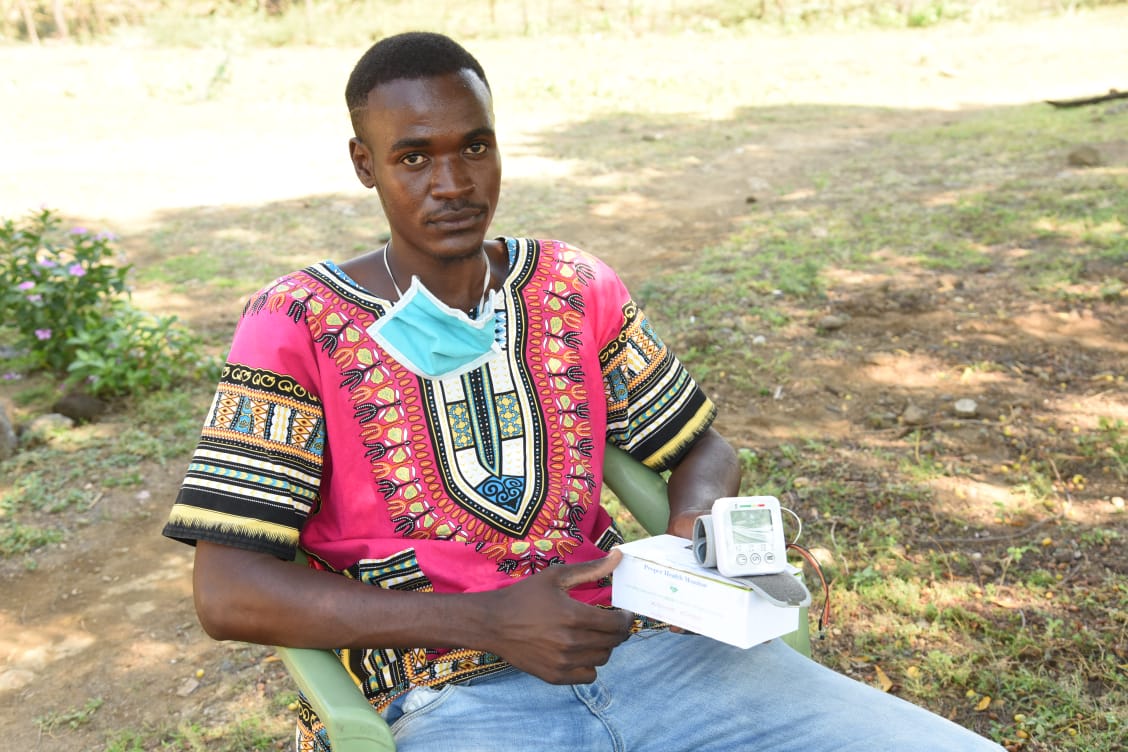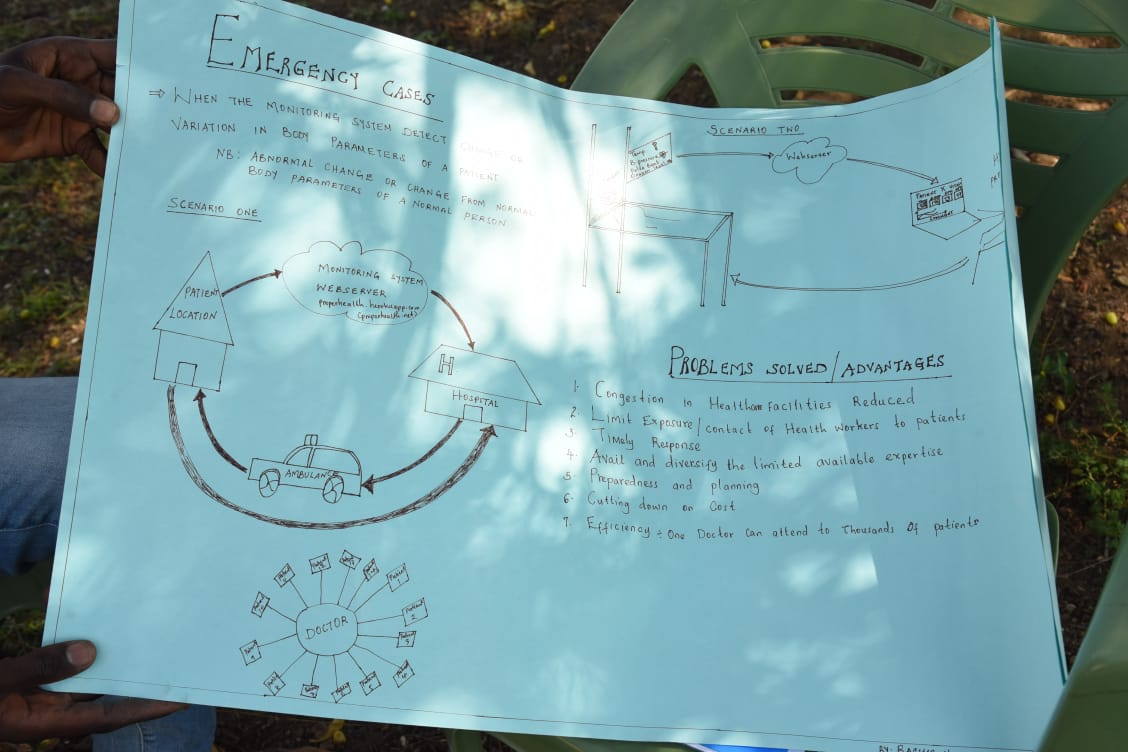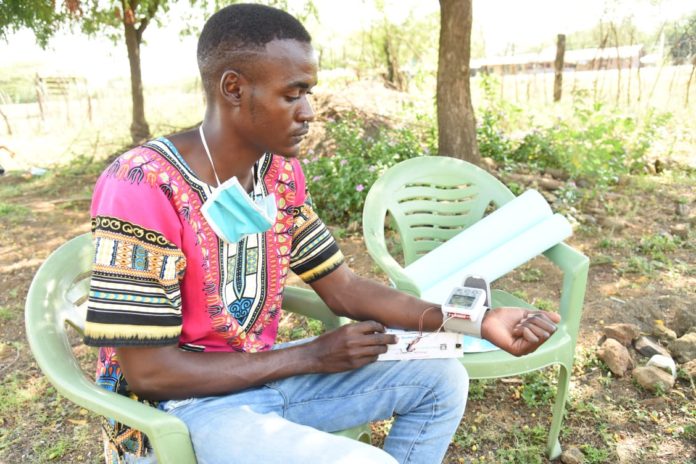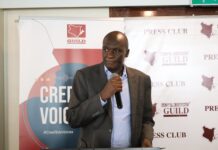By Moffin Opilio
Baringo County, Kenya: If 24-year-old Bashir Mohamed Hamisi had to describe using only one word how it was dealing with an ailing aunt, he says the word would be tragic!
When he was only 20 years old, his maternal Aunt, Amina –not her real name, moved in to live with them. Amina had been battling diabetes for about twelve years and occasionally had difficulties expressing her condition to the family.
“We would be caught unawares when her blood sugar level was already highly elevated and was nearly placing her in a diabetic coma,” said Bashir.

Additionally, he and his family live at Kampi ya Samaki, a settlement in Kenya’s Baringo County that is remotely located, and experiences transportation challenges, frequently slowing their access to health care services.
These circumstances impacted Bashir’s family in many ways, pushing him into creativity.
“I could not help it,” he says. “I felt overwhelmed, sad and angry and I had to do something to save the situation.”
Bashir narrated that with the help of books and his knowledge in electrical engineering that was acquired from the Technical University of Mombasa, he began amassing resources.
His intention? Was to build a Telemedicine monitoring device that could monitor his ailing Aunt’s condition remotely and alert him of the situation in advance in case of deviation of her body vitals from the normal range.
“My project became successful after several trial and errors,” said Bashir.
Covid-19 Outbreak
When the Covid-19 pandemic struck, the majority of developed and developing countries were affected, with health structures and resources particularly being overstretched.
Amid the rush to find the ideal response to the pandemic, the Kenyan government imposed curfews, and a partial lockdown, and encouraged social distancing among its nationals. There was also the isolation of sick persons with the symptoms related to Covid-19, which resulted in stigmatization and a lot of people dread visiting the hospitals due to fear of contracting the disease.
For this reason, Bashir saw fit to restructure the telemedicine gadget into a proper health monitoring system that focused on strengthening health infrastructure by monitoring patients remotely and connecting them to physicians in the health facilities around the Baringo region.

While most Kenyan nationals were isolated in their homes, Bashir mobilized a few youths and caregivers to help provide the locals with easy access to health care. He and the team of youths visited homes around the region, taking data on patients, including those that suffered from chronic illnesses such as diabetes and hypertension, and were willing to be monitored remotely.
“Using the gadget we would only create a patient’s portal. We would then clip a patient’s finger on a part of the device which would measure their temperature, pulse rate, oxygen, and blood sugar levels,” stated Bashir.
He added that the device would then upload the parameters to the patients’ portal for doctors and caregivers to give prescriptions and monitor the patients remotely from their homes.
Speaking to doctor Chelugo, who operates a medical clinic in Marigat town and had volunteered to monitor patients during the pandemic, the gadget had the ability to alert a patient’s physician or caregiver in advance in case of any deviation in the analyzed body parameters from the normal range.
The doctor stated that they would use an online patient portal to see patients’ test results, schedule appointments, and request prescription refills.
“During the height of the covid-19 pandemic, patients faced the burden of social distancing and increased difficulty in reaching clinicians busy with emergencies. The telemedicine gadget proved essential in addressing patients’ pressing health needs and ensuring good patient-to-clinician dialogue,” explained Chelugo.
Mwajuma Hamisi is among the patients that benefited from the use of the Telemedicine gadget. She remembers being diagnosed with atrial fibrillation (A-fib), an irregular and often very rapid heart rhythm that can lead to blood clots in the heart, around the same month covid-19 was announced in the country and there was tension all over.
“I was among the vulnerable people that had been highlighted to be of high risk of contracting covid-19,” said Hamisi, “I never wanted to be in spaces that would jeopardize my health.
Expressing gratitude to Bashir and the team of medical doctors who attended to her, the 63-year-old woman noted that the gadget was very advantageous during the pandemic as it helped her family in early preparedness and planning.
“I used to be checked on a weekly basis and was constantly in communication with my doctor,” said Hamisi.
Records from the telemedicine gadget show that for the entire period before covid-19 restrictions were lessened, Bashir and his team attended to at least ten people per week.
Turn of Events
Unfortunately, after covid-19 restrictions were eased, Bashir had to stop offering telemedicine services to the locals.
According to the 24-year-old, he experienced major financial challenges. “The project requires finances which I was not able to acquire despite presenting the idea and proof of work to the local government,” said Bashir.
“I had to venture into other projects to raise enough capital that will be invested in the project in the coming future,” he noted.
Bashir also explained that the project requires lots of expertise to be able to serve patients across the country.
“If I was able to come up with this gadget just by using knowledge in books, imagine what it would look like if various software engineers and doctors participated in this project,” he said.
Bashir noted that he is willing to revive the project that will contribute to strengthening proper access to medical care as soon as he receives funding and expertise help in the project.
This publication was produced with the financial support of the European Union. Its contents are the sole responsibility of Moffin Opilio and do not necessarily reflect the views of the European Union.














